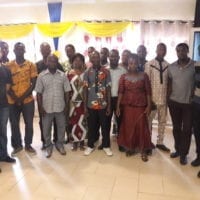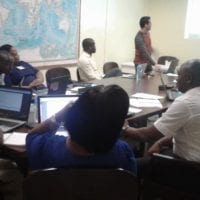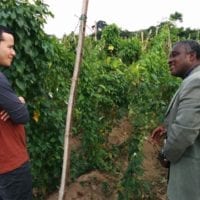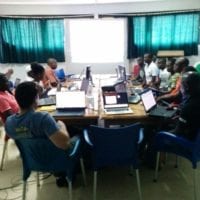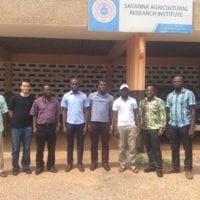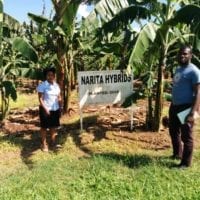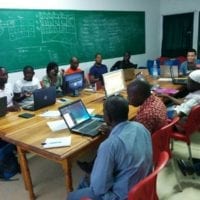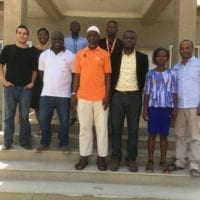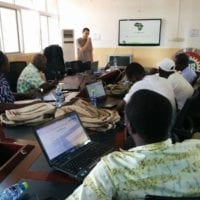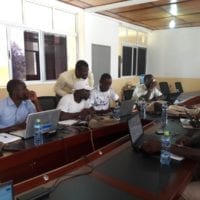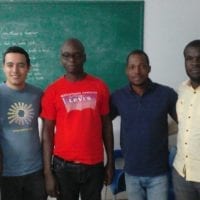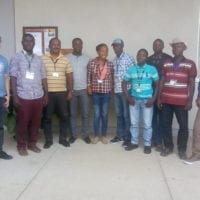News
Better breeders, better yams: YamBase workshops help improve yam breeding
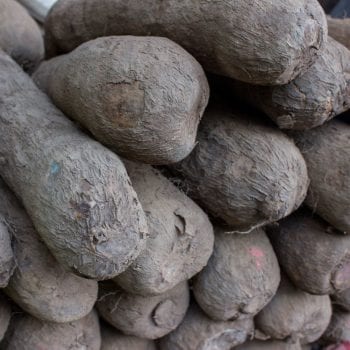
More than 54 million tons of yams are produced in Sub-Saharan Africa annually. YamBase seeks to help researchers and breeders make important improvements to this valuable crop. Credit: Felix Nartey
Yam is an important African food source and commodity; rich in starch and available all year round, yams are a valuable and vital food crop.
Over 95% of global yam production occurs in Africa’s “yam belt,” which includes Nigeria, Benin, Togo, Ghana, and Ivory Coast (Côte d’Ivoire).
Yam production is impacted by a range of issues, including disease, pests, poor soil quality, and a multitude of stressors related to climate change. In addition to making yam crops more resilient to these stressors, breeders are also seeking to improve yam nutrition and profitability.
While yam breeding has its challenges, researchers at the Boyce Thompson Institute (BTI) are developing the tools needed to breed better yams. YamBase, a breeding database developed and hosted by BTI, provides a platform for researchers and breeders to upload and access breeding data in an open-source format. The database is a valuable tool utilized by the AfricaYam Project, a multi-national collaboration which seeks to enhance breeding programs in Africa’s yam belt.
Alex Ogbonna and Nick Morales of BTI’s Mueller Lab traveled across East and West Africa to conducts trainings to African breeders on how to use YamBase effectively. Over the course of a month and a half, Ogbonna and Morales provided hands-on training at ten breeding stations in six countries. More than 70 participants joined in on the training sessions, which took place between October – December 2017.
“The hands-on training focused on demonstrating how to add, retrieve, and analyze data on YamBase. At the same time, we were also able to interact with members who are already using YamBase and help them troubleshoot issues they may be having,” said Morales. “It was important for us to physically travel to these institutions so that we could hear about each group’s use cases in a way that is often not possible.”
Many participants spoke highly of the trainings, and look forward to seeing the positive impacts YamBase will make for their institutions’ breeding efforts. “My team and I gained a lot with practical knowledge on the use of YamBase features in our breeding activities,” said Asrat Amele, a yam geneticist at the International Institute of Tropical Agriculture (IITA). “After the training workshop, we managed effectively creating trials, field books and lists, which saved our time and increased working efficiency.”
“As a lecturer in plant breeding and breeding data management, the workshop strengthened my knowledge of the database. It was very useful,” said Emmanuel Otoo, a research specialist at the Crop Research Institute of the Council for Scientific and Industrial Research of Ghana (CSIR-CRI).
In addition to improving YamBase, the results and feedback from the workshops will be used to improve other breeding databases curated by BTI. “YamBase uses the same as our other databases, including CassavaBase, MusaBase, SweetPotatoBase, and SolGenomics,” said Morales. “It is especially important that our system can accurately capture data produced in breeding programs of different crops.”
This was especially true for Ogbonna, who spent an additional week in Uganda and Tanzania to provide trainings on the banana breeding database MusaBase. Since the Muller Lab recently provided trainings at BTI to visiting researchers, Ogbonna used his travels to check in and help troubleshoot any issues in-person.
“The most rewarding part of this experience is that we were able to interact with breeders, technicians, and data managers individually and in-person,” said Ogbonna. “Making that personal connection is important; it helps participants feel that they can directly contact us and get the necessary support that they need.”
Having returned from their travels, Ogbonna and Morales will continue their work to improve the breeding databases. With promising results, they believe the workshops have set the pace for improving yam breeding at large.
“I think we will see greater interest in the database because of the workshops, and because of this we will see more data entering the system. This in turn will help researchers in the project and outside of the project access data produced across the different institutions, harmonize field practices, and increase the rate of improvement.” said Morales.
 YamBase workshops included participants from the Council for Scientific and Industrial Research’s (CSIR’s) Savannah Agricultural Research Institute (SARI) and Crop Research Institute (CRI), IITA Ibadan and Abuja, Ebonyi State University, University of Abomey-Calavi, the National Root Crops Research Institute (NRCRI), and the National Center of Agricultural Research of the Ivory Coast (CNRA Côte d’Ivoire).
YamBase workshops included participants from the Council for Scientific and Industrial Research’s (CSIR’s) Savannah Agricultural Research Institute (SARI) and Crop Research Institute (CRI), IITA Ibadan and Abuja, Ebonyi State University, University of Abomey-Calavi, the National Root Crops Research Institute (NRCRI), and the National Center of Agricultural Research of the Ivory Coast (CNRA Côte d’Ivoire).
For more information on YamBase and the AfricaYam Project, visit yambase.org and africayam.org.

